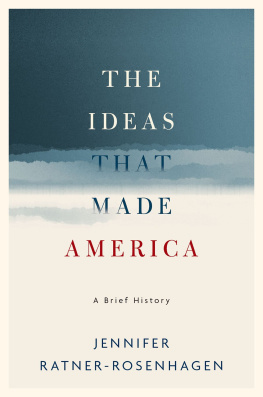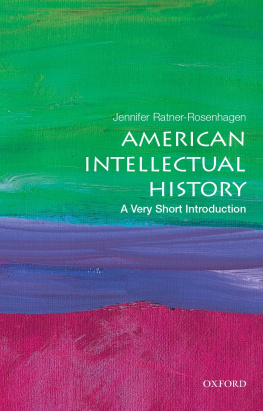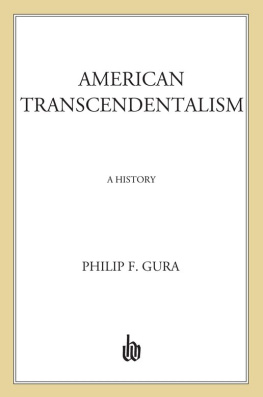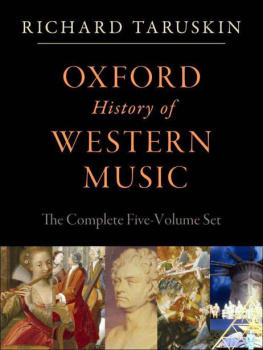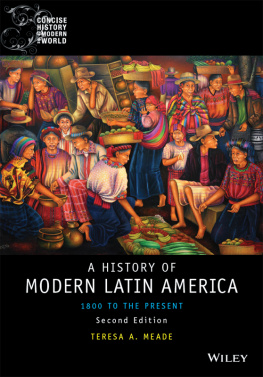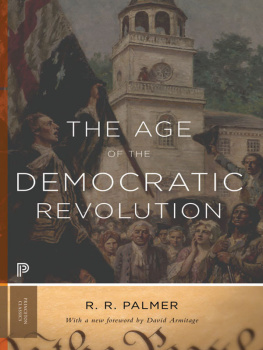The Ideas That Made America

Oxford University Press is a department of the University of Oxford. It furthers the Universitys objective of excellence in research, scholarship, and education by publishing worldwide. Oxford is a registered trademark of Oxford University Press in the UK and certain other countries.
Published in the United States of America by Oxford University Press
198 Madison Avenue, New York, NY 10016, United States of America.
Oxford University Press 2019
All rights reserved. No part of this publication may be reproduced, stored in a retrieval system, or transmitted, in any form or by any means, without the prior permission in writing of Oxford University Press, or as expressly permitted by law, by license, or under terms agreed with the appropriate reproduction rights organization. Inquiries concerning reproduction outside the scope of the above should be sent to the Rights Department, Oxford University Press, at the address above.
You must not circulate this work in any other form and you must impose this same condition on any acquirer.
Library of Congress Cataloging-in-Publication Data Names: Ratner-Rosenhagen, Jennifer, author.
Title: The ideas that made America : a brief history / Jennifer Ratner-Rosenhagen.
Description: New York, NY : Oxford University Press, [2019] | Includes bibliographical references and index.
Identifiers: LCCN 2018027744 (print) | LCCN 2018048434 (ebook) | ISBN 9780190625375 (updf) | ISBN 9780190625382 (epub) | ISBN 9780190625368 (hardback : alk. paper)
Subjects: LCSH: United StatesIntellectual life. | United StatesHistory.
Classification: LCC E169.1 (ebook) | LCC E169.1 .R35 2019 (print) | DDC 973dc23 LC record available at https://lccn.loc.gov/2018027744
In memory of Merle Curti and Paul Boyer
Contents
Even brief histories require extensive assistance to bring them into being. Support for this book came in many forms, from feedback at the early stages of its conceptualization to help with research tasks as well as comments and suggestions on various drafts of the manuscript. I am so grateful for the contributions of Laird Boswell, Zo Rose Buonaiuto, Charlie Capper, Charles Cohen, Vaneesa Cook, George Cotkin, Bill Cronon, Richard Wightman Fox, Sam Gee, David Hollinger, Daniel Hummel, Sari Judge, Michael Kazin, Jim Kloppenberg, Bruce Kuklick, Susan Laufenberg, Isaac Lee, Leonora Neville, Kamila Orlova, Dean Robbins, Daniel Rodgers, Ulrich Rosenhagen, Dorothy Ross, Jennifer Stitt, Madelyn Sundquist, Kevin Walters, Robert Westbrook, and Caroline Winterer. I want to thank the generous and resourceful archivists and librarians who helped me turn research trails from cold to hot and dead ends into breakthroughs: Rebecca Jewett, Tony Lattis, Anita Mechler, Robin Rider, and Lisa Wettelson. I am especially indebted to Nancy Toff, who invited me to take on this project and offered me invaluable advice and encouragement along the way, and to Elizabeth Vaziri and Julia Turner for their roles in shepherding the manuscript through production. The generous support from the University of WisconsinMadisons William F. Vilas Trust and the H. I. Romnes Faculty Fellowship Award provided me the time and resources necessary to complete the book.
To my loving family, Ulrich, Amelie, and Jonah, I say thank you again and again for tolerating a home choked with books and notepads, cold sandwiches for dinner, and a matriarch whose imagination too often drifted to remote places and people in American history while she was supposed to be watching them play little league (Jonah), relishing their theater performance (Amelie), or simply listening to them talk about their workday (Ulrich). I am so grateful that my mother, Miriam Ratner, was an English major back in the day when grammar was taught to students and that she was so willing to generously share her expertise as she read through all of her daughters drafts. I thank my wonderful students at the University of WisconsinMadison who taught me whatever I know about communicating my passion for this material. And these acknowledgments would be sorely incomplete were I not to express my deepest gratitude to the extraordinary scholars in American intellectual history, whose imaginative, innovative, and meticulous research has informed my narrative here and whose books are listed in the further reading section. I would feel that this book did its job if it were read as an invitation to further explorations in these and other engaging works of American intellectual history.
This book is dedicated to the extraordinary historians Merle Curti and Paul Boyer, two of my intellectual history predecessors at the University of WisconsinMadison. I never met Merle Curti, but I am so fortunate to occupy the chair named for him and thus to have him as a source of daily inspiration in my writing and my teaching. For readers interested in a longer account of American intellectual history, I recommend starting with his majestic, Pulitzer Prizewinning Growth of American Thought (1944). I did, however, have the good fortune of meeting Paul Boyer, who welcomed me when I arrived at Madison in 2006 and graced me with his brilliant mind, deep humanity, and beautiful friendship. This book is dedicated to their memory.
The Ideas That Made America
The Ideas That Made America is a brief survey of some of the most compelling episodes and abiding preoccupations in American intellectual history. While I would like to imagine that a book on the history of American thought can be as straightforward as it is accessible, I have been teaching this material long enough to know that this is not always the case. With equal parts intrigue and skepticism, students often ask me: what is American intellectual history?
The official version of American intellectual history goes something like this: it is an approach to understanding the American past by way of ideas and the people who made or were moved by them. Intellectual history seeks to understand where certain persistent concerns in American thought have come from and why some ideas, which were important in the past, have faded from view. It can focus on the very particular: a single concept (say, freedom or justice) or a larger body of thought (democratic theory or antislavery). Histories of thought can also study a particular field of knowledge, such as philosophy, psychology, or sociology, and examine how those disciplines have changed over time. All of these angles into Americans ways of thinking are used with a careful attention to time and place: Why did they come to those conclusions? Why then? Why there? For an intellectual historian, the context of the idea is as important as the idea itself. Intellectual history also concerns itself with the myriad institutions that are sites of intellectual production (universities, publishing houses, and think tanks), as well as the various practices people have employed to engage ideas (reading, writing, discussing, experimenting, and so on).
Though ideas, intellectuals, and intellectual movements are the focus in the history of American thought, it is still first and foremost a historical pursuit that adopts all the habits of mind familiar to political, economic, and environmental historians. Intellectual history may even focus on politics, economics, and the environment. But instead of using political parties, an economic depression, or weather patterns to understand American history at a particular time and place, it would approach political history by examining the ideas in a political treatise or presidential address. Its approach to economic history might be to investigate how economists interpreted the cause of a financial downturn or how unemployed laborers made sense of their difficult circumstances. And its approach to the history of the environment might consider the arguments environmental activists used to try to protect endangered species or the way a poet drew symbols from nature in her or his work.

